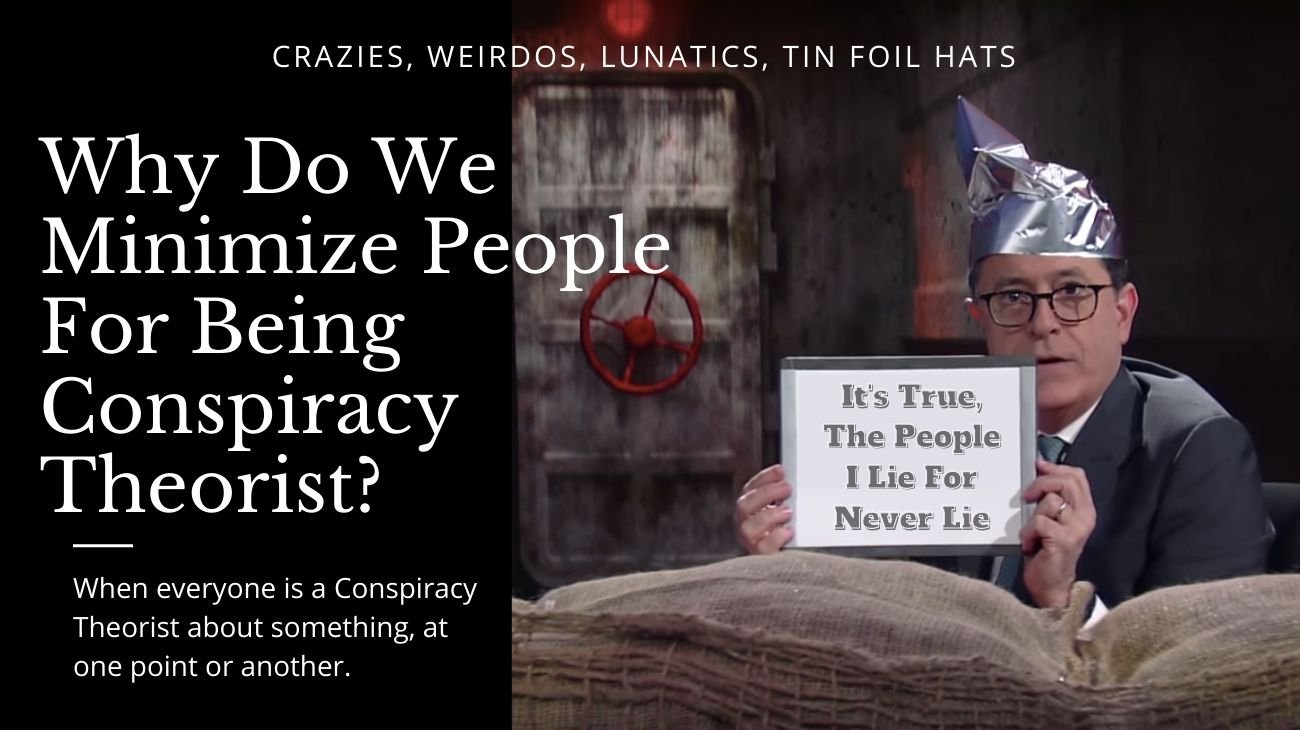Why Do We Minimize People For Being Conspiracy Theorist?

Crazies, Weirdos, Lunatics, Tin-Foil-Hats
Everyone is a Conspiracy Theorist about something, at one point or another.
Right off the bat from reading the heading of this article you likely experienced feeling a certain way. Was that feeling uncomfortableness? Was the feeling that came over you a sense of disgust, shame, defensiveness, or embarrassment, and was this emotion followed by thoughts of Tin-foiled-hats, men in black, and aliens? Isn't this how you were programmed to think and feel about the topic of conspiracy theories? Have you ever gave it a second thought to where your ideas about Conspiracy Theory originated? If you experienced any or all of these triggers you have just engaged in your mass negative social programming. Now why would anyone want you to believe and feel a certain way, mostly negative, every time a couple of words like Conspiracy Theory are mentioned?
First, let's breakdown the term Conspiracy Theory into separate parts and look up the definitions. Have you ever looked up the term conspiracy theory in the dictionary, or do you allow your perceptions of the term rule your thinking? Okay, here's the definition where we will establish a new baseline of thinking. Conspiracy; "a secret plan by a group to do something unlawful or harmful." Well that doesn't feel so tin foil hat wearing when reading the definition, does it? Those negative feelings I mentioned earlier probably never entered your body, and your mind didn't go directly to the last Hollywood spy movie you watched. Groups of people conspire against other groups and people all the time, so this is an acceptable idea.
Now let's see what Merriam-Webster says about what a Theory is. Surely it is there in that definition that we will uncover the problem. Theory; a plausible or scientifically acceptable general principle or body of principles offered to explain phenomena. 2. a belief, policy, or procedure proposed or followed as the basis of action. 3. an ideal or hypothetical set of facts, principles, or circumstances —often used in the phrase in theory. Okay, nothing there... This definition seems pretty logical and simple to understand as well. So another question we may want to ask ourselves is whether you have to be a certain type of person ie. an Educator to understand these definitions? The answer is no.
Reading the words conspiracy theory definitions separately doesn't likely make you have the feeling or ideas previously mentioned above. But surely something must be wrong with the idea of being a Conspiracy Theorist because most times when someone mentions the term in media, government, movies, psychological fields, and in general people are poking fun. If I didn't know better I would begin to think that there is an actual conspiracy against Conspiracy Theorist. But this cannot be possible, or could it? We've probably heard somewhere before Conspiracy Theorist called Crazy, Weird, Lunatic, or wearers of tin-foiled-hats. Hell I can name 10 movies off the top of my head with characters who wore tin-foiled-hats in the movie. Remember the movie Signs with Mel Gibson? There was that scene where Gibson's character brother and two children sat on the couch all adorned with tin-foiled heads.

Second, if we put the two words together and place into a Google search what comes out? Conspiracy Theorist; a person who believes that some secret but influential organization is responsible for a particular event or phenomenon. Wow! For sure It was there in the Google search that I thought I would find the damning evidence of the Men In Black opts mind control definition, but no, not there either. Okay then we have a real problem on our hands. Nowhere in a search of definitions does the term conspiracy theory or being a Conspiracy Theorist raise a red flag. So why do people of major influence in media like Joe Rogan, Russel Brand, Stephen Colbert, and even members of government speak so negatively when mentioning anything around the topic of conspiracy theories.
Of course there are some pretty outlandish conspiracy theories, and people have their limits on what they believe versus what they will deny. But here's a absolute fact. Everyone is or was at some point in their life a conspiracy theorist about something. Yes, Everyone, even you. Take a minute to go into your mental database to see when the last time you believed someone, or a group of people were plotting against you or someone you know. It doesn't matter whether your conspiracy theory was true or not, only that you thought of one. Don't worry you are not alone as there are many well known people who also believe or believed in conspiracy theories, from actors to the presidents. Yes more than one President of the United States believed in conspiracies and even spoke about them during speeches addressing the public.
Third, I had to find some research that wouldn't support or refute my statements so that you can come up with your own conclusions about this topic. I figured I would search the term " what famous people have made fun of conspiracy theorist?" to see what results returned. This was good because I found a podcast interview on the American Psychological Association website with Professor of Psychology Karen Douglas, Ph.D. The host of the show was Kim Mills, and the reason I chose this particular podcast was because you can listen and read the shows conversation at the same time. This is important as there are undertones in the show that may or may not support my sentiment about negative ideas around people who believe in conspiracy theories.

If everyone believes in conspiracy theories at some point in their life as pointed out by Douglas then why do we speak as if Conspiracy Theorist are crazy people? Why do we consider a community of people who do research, peer review, and seek the truth as outliers to society? Arguably one of the best and most respected presidents in history John F. Kennedy spoke of "secret societies" in government. Was President Kennedy crazy, or did he understand there were people in government, people that worked closely around him that were not for the people. The public at large may never know the full truth about JFK's assassination but someone does. Mills and Douglas seem to want conversations involving any topic around conspiracies about Government, Big Pharma, etc. headed off at the pass. Why would conversations that may lead to truth be stifled and labeled misinformation?
Lastly, If there are people who wish to control the flow of information to control how people think and behave wouldn't they want to demonize anyone suspicious of them. Historically there has always been factions, infighting, and outright plots with government over struggles for power. Why would any of this type of behavior change because we think we live in a civilized society? People are still people, some are good and some are bad, but both types hold positions in government, media, and Hollywood. These days I would argue that we have an overwhelming amount of leaders in the US and around the world who most definitely do not have the people's best interest in mind.

In Closing, if Conspiracy Theorist are silenced completely there will no longer be people to challenge any mainstream narrative. The public will have no one to stand for truth. It is an absolute fact that Conspiracy Theorist will not be correct every time a new conspiratorial idea is discovered. But with no one checking, governments will have zero resistance against putting forth any agenda. Polls have shown that most people do not trust their government, and yet the majority of people do what their governments tell them without question. This is a form of cognitive dissidence where masses of people are in conflict with their critical thinking and feelings. People know factually that government plot to harm and control the public, but they still want to trust the people doing the harm. People don't want to believe that their government or political leaders are capable of negative deeds against them. Not In My Country, Not My Government.
I would ask that you put your thinking cap on and look into some of the conspiracy theories you think are unbelievable and even the ridiculous. You may discover that your points of view were unchecked and unchallenged for far to long. You may find that the slightly weird neighbor down the street understands the world a bit better than you. Conspiracy Theories are also a lot of fun to talk about if you aren't afraid or to "smart" to dig into some of your own suspicions about your government. If everyone is searching for the truth, which is mainly what Conspiracy Theorist do, then eventually the truth is what we will find, Together.
by: Michaelson Williams, TSX





[spam]